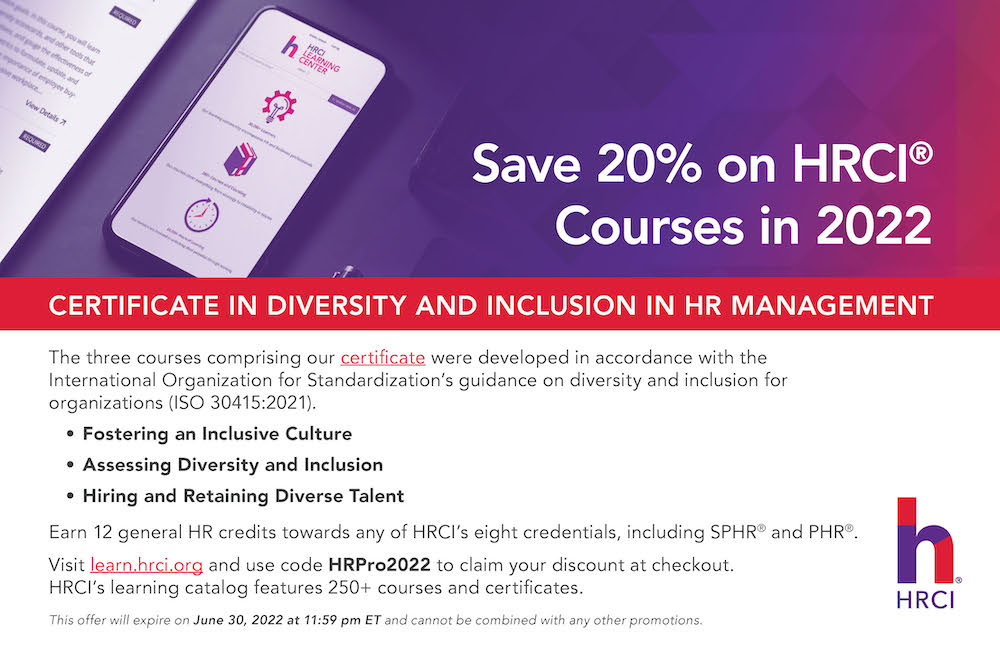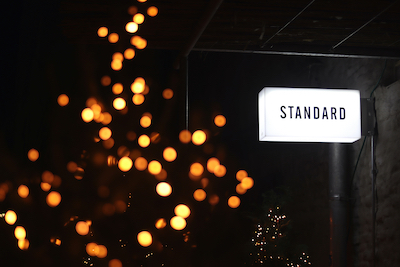By Amy Dufrane
As the premier HR credentialing and learning organization for more than 45 years, HRCI® continues to set the global standard for HR expertise and excellence. We do so through our commitment to the development and advancement of our world-class learning, as well as the administration of eight global certifications, helping professionals achieve new competencies that drive business results.
Building on our success in the global HR community, HRCI is proud to announce our new subsidiary, the Human Resource Standards InstituteSM also known as HRSISM.
By way of our association with the International Organization for Standardization (ISO), we have come to appreciate that global standards help organizations align business goals with consensus-based global practices for greater understanding of – and continual improvement in – HR processes and practices. HRSI will allow us to share that commitment to excellence in HR practices, via organizational certifications built on the ISO standards, the first of which is 30415:2021: Human Resources Management – Diversity and Inclusion.
This and subsequent HRSI organizational certifications will help ensure that organizations’ HR activities adhere to consensus-based, international HR standards and align around business goals. HRSI organizational certifications also allow for comparisons of practices on objective bases with other organizations across national boundaries and industry sectors.
What is ISO, and why should your company care about its standards? ISO is an independent, non-government body that represents 167 countries around the world. Its mission is to develop systematic frameworks and guidance for regulators, governments and companies to facilitate continuous improvement. For more than a decade, ISO has been examining Human Resource Management (HRM), and, in 2011, ISO convened HR experts from thirty-one (31) countries to participate in a Technical Committee (TC) to create HRM standards. Referred to as TC 260, these standards offer guidance for the optimization of organizational performance, improved value creation, sustainable development and higher levels of workforce productivity, satisfaction and engagement. In May 2021, HRCI was appointed by the American National Standards Institute (ANSI) as the International Secretariat for the ISO TC 260 on HRM.
What is the value of the HRSI organizational certification process? Good question. I do not need to tell you how the role of HR has morphed into far more than we ever imagined. Today’s HR professional combines business strategist, data analyst, brand ambassador and workforce mediator into what was already a full-time job. There is an increased need to attract, retain, develop and advance talent, and HRSI organizational certification is a clear signal of quality. The certification empowers both business and HR leaders to ensure their processes and practices are aligned with organizational goals and standards, with further validation of being in line with global standards. By earning the badge and seal of excellence after being validated by HRSI, HR is elevating its role as creators and drivers of real business value.
What is an example of how HRSI certification can advance business outcomes? HRSI organizational standards are designed to help organizations evaluate and improve processes to meet a specific ISO standard to show the marketplace they are aligned with the best practices and committed to continual improvement. In its first certification, which will help organizations earn recognition for best practices in diversity and inclusion (D&I), HRSI and ISO recognize that D&I practices evolve and are a continual learning process. Having standards that support consistency helps ensure equity and inclusion for employees. As job seekers, customers, investors and governmental agencies increasingly demand that business relationships are informed by D&I principles, this is an imperative for organizations and why HRSI started its “org cert” initiatives with a focus on D&I. This era of the “great resignation” has illuminated how profoundly employees are rethinking their relationship with work and re-evaluating their purpose, making D&I more important than ever.
The HRSI D&I Organizational Certification leverages ISO guidance, which was developed by global HR professionals and approved by thirty-two (32) participating member countries. Achieving the certification is a clear sign to employees, candidates and partners that the business is dedicated to diversity, inclusion, equity and belonging. Conversely, a failure to earn certification leaves customers, employees and other stakeholders perceiving an organization’s brand negatively; potentially causing concern as to why a business may not place the necessary focus on D&I standards.
How do we get started? We know how busy HR professionals are, and the application process has been streamlined to ensure a friendly user experience. The steps include:
- completing the readiness assessment;
- evaluating the results;
- engaging with additional resources (if necessary);
- applying for certification;
- receiving assessor feedback and certification results; and
- planning for re-certification.
The estimated timeframe for this process is 30 to 90 days, contingent upon the amount of time needed to construct the verifying documentation and answer questions. Once obtained, there is an annual check-in process. To recertify, the accreditation process would reactivate within 72-months (five years) from the original certification date.
Driving standards in the HR discipline is our life’s work, and I know you will be eager to earn the HRSI seal. While D&I is our first organizational certification, it represents one of more to come as we tackle the issues faced by HR as our profession continues to evolve. To learn more about the path to certification, please connect with us by visiting www.hrsi.org. or emailing info@hrsi.org. We look forward to celebrating your organization’s commitment to aligning business and HR goals and objectives through standards.


